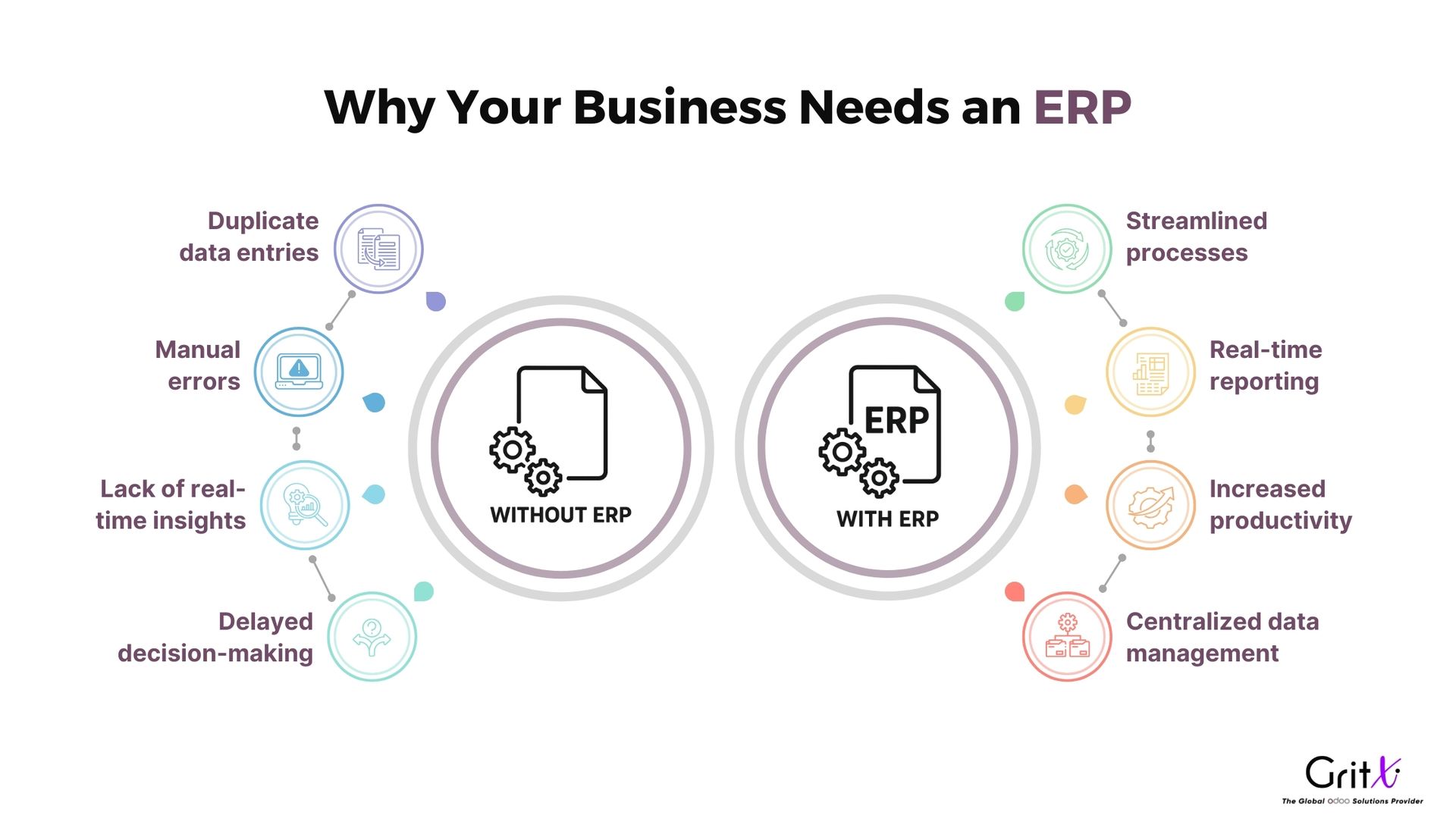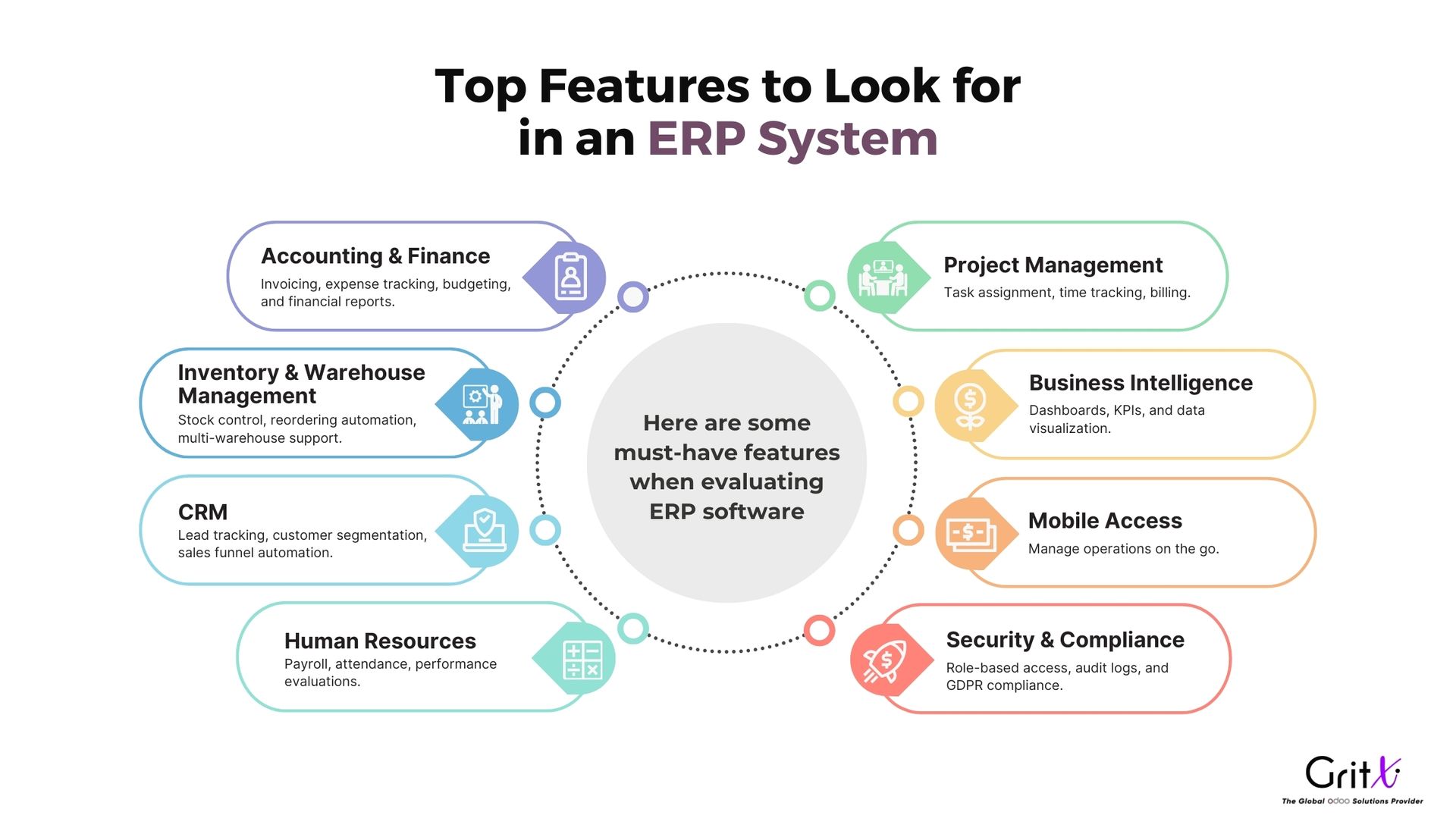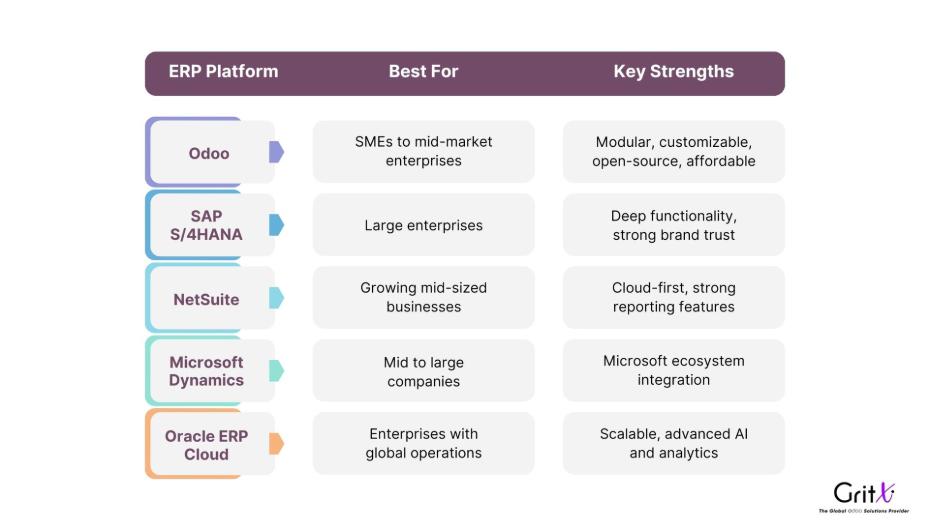In today’s fast-paced business environment, managing operations with disconnected systems can slow you down and drain resources. That’s where an ERP system (Enterprise Resource Planning) becomes essential. But with so many options available, choosing the right ERP system can feel overwhelming.
In this blog, we’ll walk you through everything you need to know before selecting an ERP—what it is, why it matters, what features to prioritize, and why Odoo might be the best choice in 2025.
What is an ERP System?
An ERP system is software that unifies core business functions such as accounting, inventory, human resources, customer relationship management (CRM), and sales into a single integrated platform. Instead of juggling multiple tools, an ERP centralizes your data and workflows for better coordination, real-time insights, and operational efficiency.
Why Your Business Needs an ERP
Running a business without an ERP system often leads to:
- Duplicate data entries
- Manual errors
- Lack of real-time insights
- Delayed decision-making
With an ERP, you get:
- Streamlined processes
- Real-time reporting
- Increased productivity
- Centralized data management
- Better collaboration across teams
Whether you’re a startup or an enterprise, investing in the right ERP system can save time, money, and confusion.
Key Factors to Consider Before Choosing an ERP System
1. Business Size and Industry Fit
Not every ERP system suits every business. Choose one designed to meet the needs of your size and industry—manufacturing, retail, service, logistics, etc.
2. Total Budget and ROI
Beyond the licensing cost, calculate implementation, customization, training, support, and maintenance costs. Look at total cost of ownership (TCO).
3. Customization and Scalability
Can the ERP adapt as your business grows? Custom modules and scalable architecture are must-haves for long-term success.
4. Deployment Model: Cloud vs On-Premise
- Cloud ERP: Lower upfront costs, accessible from anywhere, automatic updates.
- On-Premise ERP: More control, better for complex internal infrastructures.
5. Integration Capabilities
The ERP should easily integrate with your existing systems—eCommerce platforms, payment gateways, third-party logistics, etc.
6. Vendor Support and Community
Choose a vendor with reliable customer support, a strong user community, and active development.
7. Implementation Timeline
Some ERPs take months to go live. Choose a system that aligns with your deadlines and offers a manageable learning curve.
8. User-Friendliness
The ERP interface should be intuitive, minimizing employee training and resistance.
Top Features to Look for in an ERP System
Here are some must-have features when evaluating ERP software:
Accounting & Finance: Invoicing, expense tracking, budgeting, and financial reports.
Inventory & Warehouse Management: Stock control, reordering automation, multi-warehouse support.
CRM: Lead tracking, customer segmentation, sales funnel automation.
Human Resources: Payroll, attendance, performance evaluations.
Project Management: Task assignment, time tracking, billing.
Business Intelligence: Dashboards, KPIs, and data visualization.
Mobile Access: Manage operations on the go.
Security & Compliance: Role-based access, audit logs, and GDPR compliance.
ERP Implementation: What to Expect
ERP implementation is a strategic process. Here's a high-level view:
Step-by-Step ERP Implementation:
Define Business Needs: Outline objectives and must-have features.
Evaluate and Choose a Vendor: Research and compare ERP platforms.
Data Migration: Transfer your current data into the new system securely.
Customization and Configuration: Tailor the ERP to your workflows.
Training: Educate users for seamless adoption.
Go Live: Launch the ERP and begin monitoring performance.
Ongoing Support: Resolve issues and ensure updates.
Common Mistakes to Avoid
When selecting an ERP system, avoid these pitfalls:
Choosing based on price alone
Skipping a detailed needs analysis
Underestimating implementation complexity
Failing to involve key stakeholders
Neglecting employee training
Ignoring long-term scalability
Why Odoo Is One of the Best ERP Choices in 2025
When flexibility, affordability, and feature depth are your priorities, Odoo ERP is one of the smartest choices available today. Here’s why it’s a favorite among growing businesses and enterprises alike:
1. Modular Architecture
Odoo offers over 40 core modules and thousands of community apps. You can start with essentials (like invoicing or CRM) and add others (like manufacturing or HR) as you grow.
2. User-Friendly Interface
Odoo's interface is clean, modern, and easy to navigate—ideal for teams who want functionality without complexity.
3. All-in-One Platform
Instead of using multiple disconnected tools, Odoo provides everything under one roof: Sales, Inventory, Finance, HR, Marketing, and more.
4. Highly Customizable
Odoo’s open-source foundation means your business can develop custom workflows, reports, and modules tailored exactly to your needs.
5. Cloud & On-Premise Options
Odoo gives you the flexibility to choose your preferred deployment method based on budget, infrastructure, and security preferences.
6. Lower Total Cost of Ownership
Compared to ERP giants like SAP or Oracle, Odoo is budget-friendly while still offering enterprise-grade features.
7. Global Community & Partner Network
With thousands of contributors and certified partners worldwide, finding support, updates, and add-ons is easy.
Odoo Tip: Looking for an ERP system that balances innovation, simplicity, and affordability? Odoo could be your perfect match.
Popular ERP Options in 2025
If you're still comparing, here are some top ERP platforms to evaluate:
Final Checklist Before You Decide
Before making your ERP choice, ask yourself:
- Have I clearly defined my business goals?
- Have I evaluated both cost and ROI?
- Is the ERP scalable for the next 5–10 years?
- Does the vendor have industry experience?
- Have I involved end-users and stakeholders in the decision?
- Am I prepared for the implementation process?
Conclusion
Choosing an ERP system is a long-term investment that impacts every corner of your business. From operations and customer service to finance and HR—an ERP can streamline, simplify, and supercharge your performance.
Don’t rush. Evaluate thoroughly. And always choose a system that grows with your business.
Need expert help? Reach out to our team today for a personalized Odoo ERP demo or consultation.
Everything You Need to Know Before Choosing an ERP System